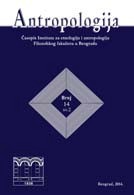INFLUENZA AND THE CONCEPT OF INFECTION: REFLECTIONS ON BODILY BOUNDARIES
INFLUENZA AND THE CONCEPT OF INFECTION: REFLECTIONS ON BODILY BOUNDARIES
Author(s): Meike WolfSubject(s): Sociology, Health and medicine and law, Globalization
Published by: Институт за етнологију и антропологију
Keywords: Influenza; bodily boundaries; vaccination; globalization; prevention;
Summary/Abstract: In 2009 a novel strain of the influenza virus caused the first worldwide flu pandemic in more than 40 years and thereby marked a turning point in the medical history of the flu: Nowadays influenza plays a key role in international attempts of preventing and managing infectious diseases. But while there is much focus in this debate on the epidemiological and biological aspects of pandemic threats, not much specific work has yet been done on the impact of influenza on the conceptualization of the human body and its embeddedness in larger global forces. Seen from an anthropological point of view, the spread of the influenza virus could only occur if certain sociotechnical practices, environments and connections were in place: On-going globalization processes show an accelerated effect on the development and spread of the influenza virus, as empirical research has shown. Taking these complex transnational flows and pathways, influenza must be analysed as a mobile, transgressive and non-territorial phenomenon, challenging traditional limited concepts of the human body, of space, culture and prevention. Post-Foucault, it can be assumed that biotechnologies, preventive discourses and practices are constitutive of the construction of subjectivities, the human body and social order in general. It is in this context that bodily boundaries are not static, however. They may vary with medical treatment, age or disease. Interestingly enough, the influenza virus functions as a transgressive agent with material potential, representing the threatening other, blurring the boundaries between self and non-self, bringing together concepts and technologies of prevention, human bodies, pigs, vaccines and discourses on biosecurity. In my paper, I wish to emphasize the fundamental important role that influenza may play in processes of maintaining health and preventing infectious disease under the specific conditions brought about by globalization processes and its impact on the biopolitical management of the human body. Specifically, I suggest taking account of current concepts of prevention which go hand in hand with emerging effects of power and new forms of governance.
Journal: Antropologija
- Issue Year: 12/2012
- Issue No: 2
- Page Range: 107-121
- Page Count: 15
- Language: English

